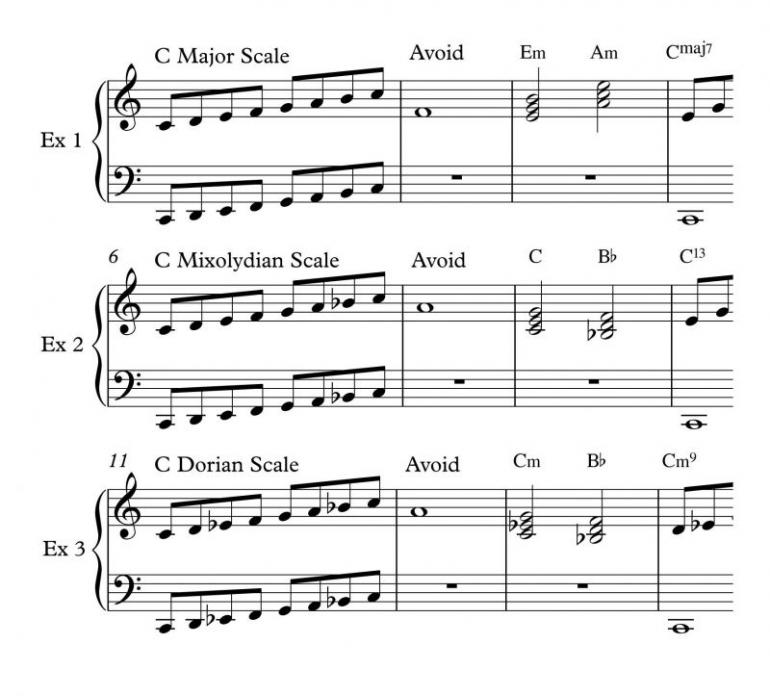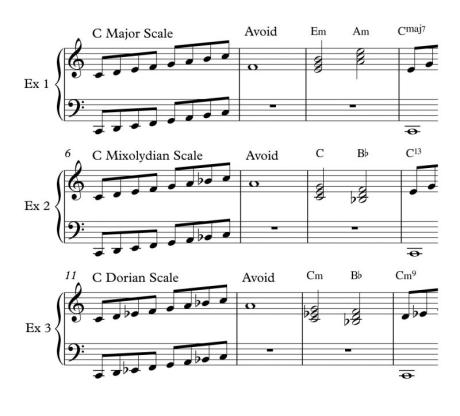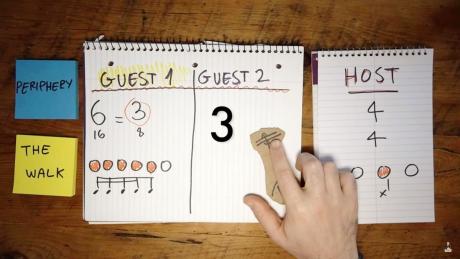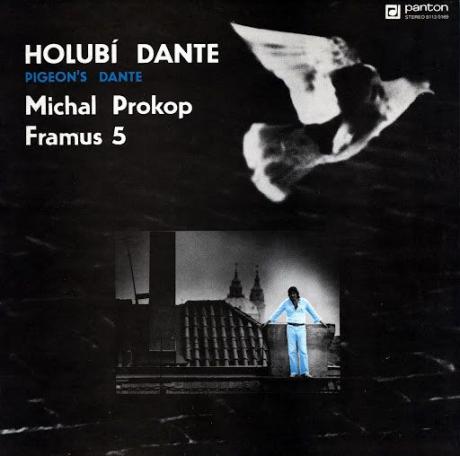Rockové klávesy - Být, či nebýt aneb vyvarovat se, nebo nevyvarovat se „avoid“ tónům ve stupnici

Greetings readers! Welcome to another installment of Rock Keyboards. This month I wanted to speak about the concept of avoid notes in soloing with scales. Probably the most common avoid note is the IV of a major scale (the Bb of a F major scale). First, we will look at the most common scales and what chords they work with, then we will investigate the avoid note. I will actually illustrate this approach with a technique called hexatonic playing. This is when take the notes of two triads from each scale and use them as a set of notes to play our solos and chords with. Each set of notes will, in effect, remove one note from the parent scale. By experimenting with a random combination of the triad pair arpeggios in single note soloing and chord construction, interesting patterns are effortlessly created. The only thing to keep in mind is the “shape” of the two triads and, in further practice, to be able to do this in every key. Lets look at the exercises.
Ex. 1 major harmony
Here we have C major scale. All examples here are in C, transpose to different keys when you understand the theory. Bar 1 has the scale. Bar 2 has the avoid note, f, this may be the instance when a note is most avoided; the fourth on a major scale. Our triads are Em and Am. Bar 3 and 4 have lines and chords created from a random combination of notes. Remember to switch very randomly between the six notes. Just focus on the shapes. These ideas work over major triads and M7 chords.

Ex. 2 Dominant Harmony
This is C mixolydian which works over dominant chords with a b7. The avoid note is said to be an a, but in practice, lots of people use this note. It will also help to think of our triad pairs more like a small system than like notes to avoid. The triads here are C and Bb. When combined they make interesting lines and chords with lots of cool intervals.
Ex 3. Minor Harmony
C dorian has b3 and b7 and works well over minor triads and m7 chords. We also combine i and bVII here. The i chord just has a minor third. Notice that the tonic and bVII relationship of the last two examples is very easy to remember and transpose through the keys. We have a as our avoid note here also, but I have to say, it’s my favorite note to play over this chord. Remember in your improvisations to switch quickly and randomly from one triad arpeggio to the other. Play the triads in inversions also for a wider sound. For extra credit, try going through this exercises in a new key! See you next time :)
Slovníček frází a hudebního žargonu
Vážení čtenáři, v dnešním slovníčku se podíváme na následujících šest výrazů. Některé z nich už jsme ve slovníčku měli, v dnešním článku se vyskytují v jiných spojeních, proč si je tedy nepřipomenout.
Avoid notes: Slovíčko avoid jsme si překládali už v minulém dvojčísle. Psali jsme si, že znamená zabránit, zamezit, vyvarovat se, ale také vyhýbat se někomu. Spojení avoid notes bychom tedy mohli trochu tupě přeložit jako noty, kterých se vyvarujeme, nebo vynechané noty. To by nám ale unikl podstatný detail. Jde o tóny, které jsou nežádoucí v dané harmonii, jsou disonantní, zvukově nelibé. Můžeme je použít jako přechodové tóny k cílovým tónům, těm, které jsou harmonicky silné. V durové stupnici, jak v článku píše Brian, jde třeba o čtvrtý stupeň, tedy kvartu. Například Bb v F durové stupnici.
Illustrate: Ilustrovat je slovíčko plně domestikované v naší mateřštině, takže tady moc nemusíme přemýšlet. Můžeme ale využít i synonyma znázornit nebo názorně ukázat. Třeba takto: Větu „I will actually illustrate this approach with a technique called hexatonic playing“ přeložíme takhle: Tento přístup si názorně ukážeme na technice zvané hexatonické hraní.
Triad: je trojice, triplet. Ale pokud byste snad chtěli mluvit o Svaté Trojici, musíte použít jiné slovíčko, Trinity, s velkým T - Holy Trinity.
Parent scale: Slovíčko scale už jsme probírali v červnovém čísle. Tam jste se dozvěděli, že scale znamená v hudební praxi stupnice nebo tónina. Parent pak znamená rodič, ale také zdroj, tedy v tomto spojení zdrojová nebo původní stupnice.
Effortlessly: Effort je snaha i námaha. Less znamená v angličtině méně, funguje i jako koncovka a jejím připojením (-less), otočíme původní význam slova. V češtině vložíme před původní přídavné jméno, nebo v tomto případě příslovce, to poznáme podle zakončení -ly, předponu bez-. Tedy effortless znamená bez námahy.
Exercises: Exercise může být podstatné jméno i sloveso. Podstatné jméno znamená cvičení, ale také úlohu, i když domácí úkol bychom řekli homework. Sloveso má řadu významů, vedle těch nejpoužívanějších, tedy cvičit nebo vykonat, může znamenat také uplatnit. Můžete třeba uplatnit svá práva, exercise your rights.




